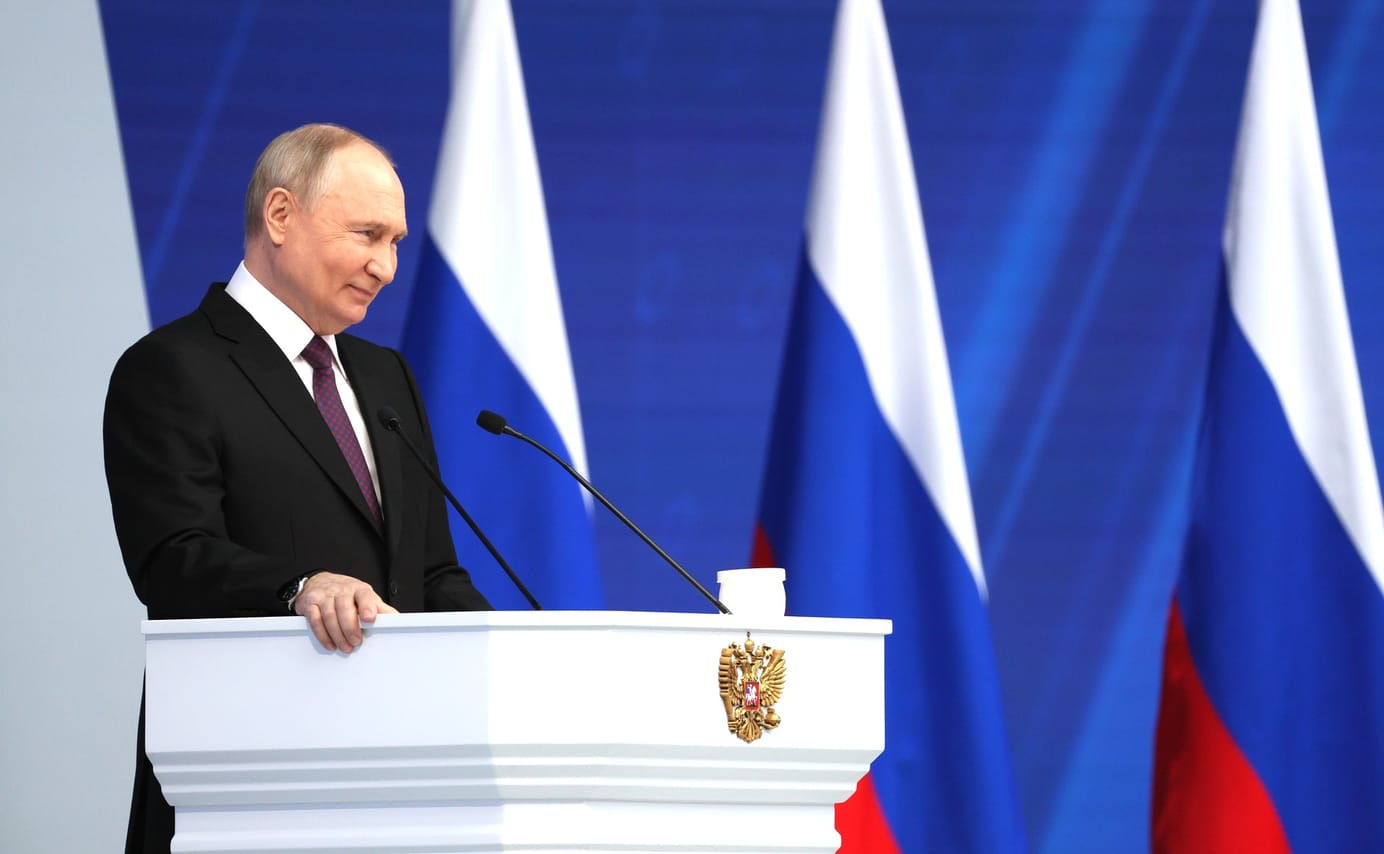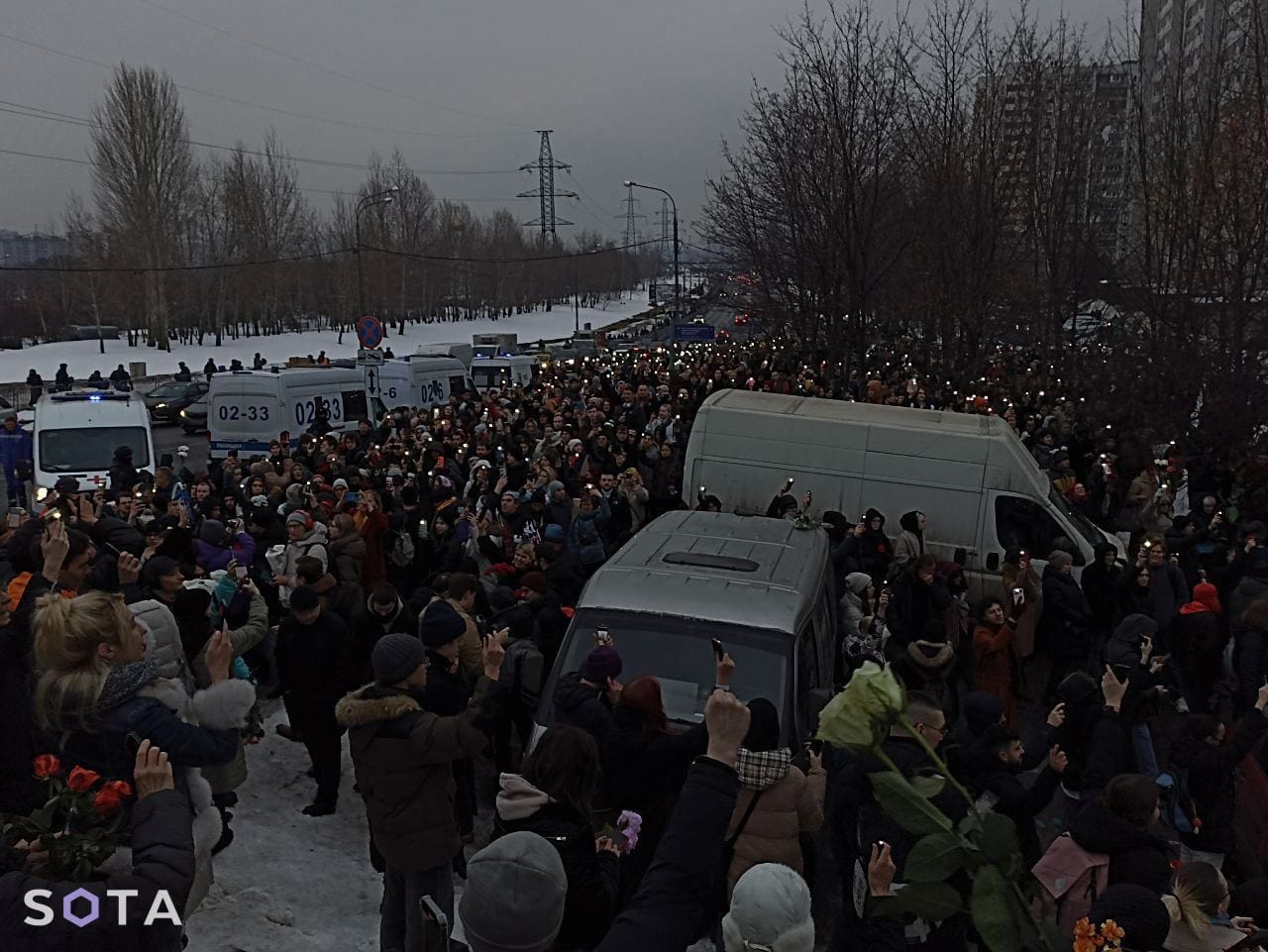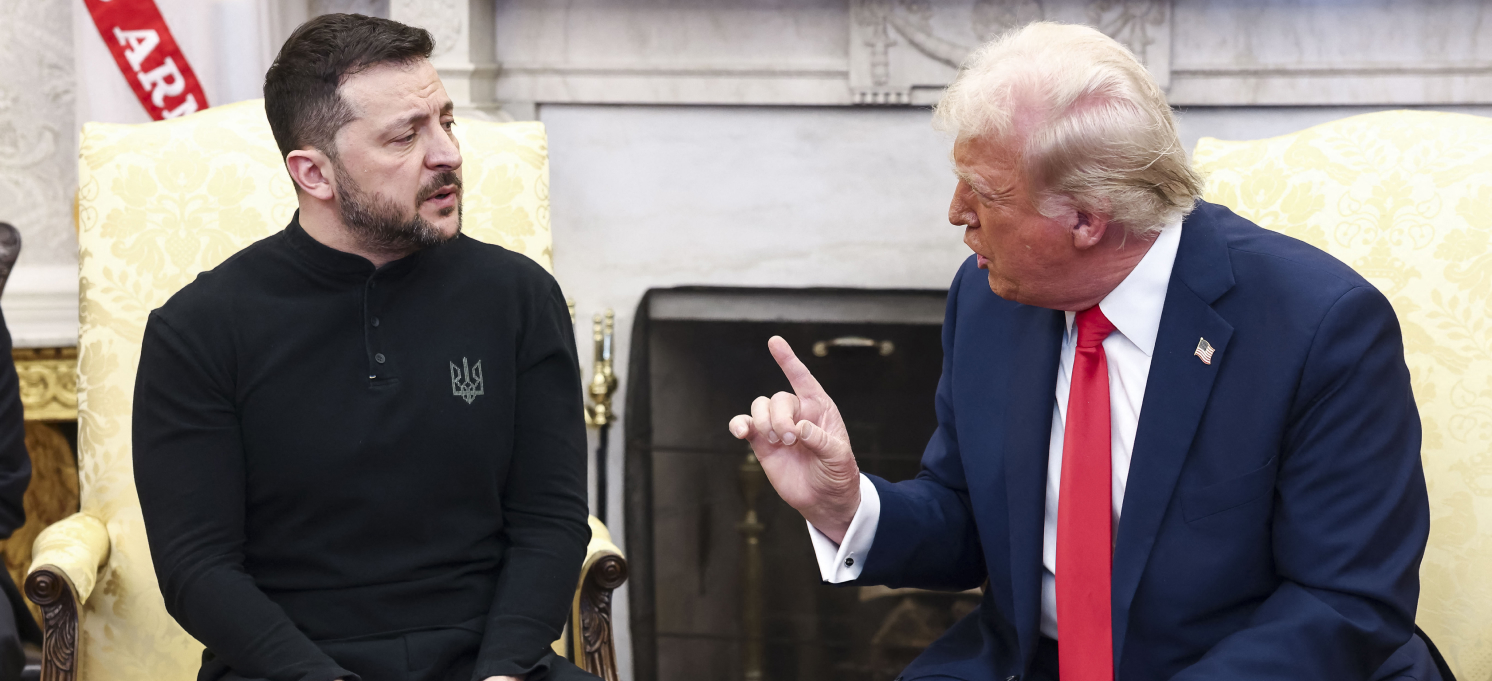
Less capitalism, more state
Hello! Welcome to your weekly guide to the Russian economy — written by Alexander Kolyandr and Alexandra Prokopenko and brought to you by The Bell. Our top story is an analysis of Putin’s state-of-the-nation address and what he said about the role of the state in the economy, possible tax hikes, and continuing nationalizations. We also look at the reason for a major internet outage in Russia this week.
Putin’s state-of-the-nation address offers Soviet vision of Russia’s future
Russian President Vladimir Putin’s state-of-the-nation address Thursday broke records, both for length and the number of “spontaneous” outbreaks of applause (there were 116 of them, according to one count). But the parallels with the Soviet Union don't end there. Putin spent only a short time talking about the main threat to the economy – Russia’s war in Ukraine – and instead threatened the West, engaged in nuclear saber-rattling, and appeared to promise a far greater role for the state in the Russian economy.
Putin competing with Putin
Unlike last year, Putin radiated confidence in his speech to lawmakers. He is clearly satisfied with the situation at the front, and believes there are enough resources to continue fighting for at least another year. However, opinion polls suggest that the most popular candidate in presidential elections next month would be someone who does not harp on about the war, but who offers solutions to Russia’s domestic problems. So, once he’d got the saber-rattling out of the way, the lion’s share of Putin’s speech was about his plans through 2030.
According to the president, Russia needs more social spending, higher birth rates, longer life expectancy and fewer imports. Of course, that’s basically what the country needed during his previous six-year presidential term. Putin continues to compete with himself.
One of the new initiatives that Putin announced was five “national projects.” Four of these (Family, Youth, Long and Active Life, and Personnel) are related to human capital. Only one, Data Economy, relates directly to the economy.
Putin's speech suggested the state intends to act as the major player on the market – not just as a guarantor. He set a target to double capitalization on the Russian stock market by 2030 – not a hugely ambitious goal considering that the S&P 500 Index in the U.S. doubles in value roughly every seven years (and inflation in Russia is much higher than the U.S.).
Putin also pledged billions of dollars of spending. The promised new spending over the next six years comes to around 6 trillion ($66 billion), or about one trillion rubles a year. It may sound like a lot, but in reality it is relatively little – about 0.6% of GDP each year.
New taxes?
However, even these relatively modest sums must come from somewhere. And Putin hinted that the state could impose new taxes, or raise existing ones, to pay for its additional social spending, as well as to boost productivity and to wean the country off imports.
In particular, Putin suggested raising corporate taxes and hiking income tax for the wealthy. Coincidentally, just three days before the speech, pro-Kremlin media reported the existence of legislation that would raise taxes for high earners. That legislation was not backed by the United Russia party, so it is unlikely to gain traction. It should be seen as a trial balloon. However, the idea of raising income tax to 25% on those who earn above 500 million rubles a year would raise about 1 trillion rubles a year – enough to fund all Putin’s spending promises.
Russian officials have spent years talking about shifting from Russia’s flat rate 13% income tax to a more progressive system. In 2021, income tax rate was increased to 15% on individuals who earn more 5 million rubles ($55,000) a year. The higher tax applies to all earnings above this threshold. From a bureaucratic point of view, however, implementing a progressive income tax presents several major problems:
- Income tax goes to regional governments, which means that raising taxes will increase Russia's already significant level of regional inequality;
- Progressive taxation could cause companies to take salaries off the books and pay wages in cash – resulting in an overall fall in revenue;
- Progressive income tax is first and foremost a tax on the middle class. In modern Russia, a large proportion of the middle class are state employees, particularly security officers and soldiers who the Kremlin would not like to irritate by taking money out of their pocket. They would likely need preferential treatment.
A more realistic alternative to hiking income tax would be a review of corporate income tax, which currently stands at 20%. Indeed, businesses have already suggested they would not be unhappy with higher taxes. Alexander Shokhin, chairman of the Russian Union of Industrialists and Entrepreneurs, a lobby group, said in December that businesses had no objection to a tax rise if the government stopped levying one-off payments.
A new elite
Another important takeaway from Putin's speech was that those pursuing private business have, in effect, been erased from the national elite. Putin put it bluntly. “The word “elite” has discredited itself, especially when applied to those who lined their pockets in the 1990s,” he said. “The real elite are the workers and warriors who serve Russia.”
Putin confirmed what businessmen already understand: the nationalization of assets will continue. Strikingly, up until now, Putin has acted as guarantor of the outcome of the 1990s privatization. And as recently as last year he said there would be no new nationalization. But a creeping reversal is well underway. The former assets of Mikhail Abyzov and Andrey Melnichenko's Metafrax company reverted to state ownership in 2023, and, so far this year, the state has taken control of leading auto-dealer Rolf, and a large metals holding formerly owned by Yuri Antipov, a 1990s billionaire who was detained on fraud charges.
Putin believes the true elite are the “heroes” of Russia’s armed forces fighting in Ukraine. And he called for military veterans to play a greater role in managing enterprises, teaching and state service. Starting March 1, veterans will be able to sign up for a special program called “Time of Heroes.” Soldiers in Ukraine already enjoy more social benefits than anyone else in Russia. Among the most recent proposals, the Finance Ministry suggested exempting them from interest payments on outstanding loans.
Come again?
There were also some odd moments in Putin’s speech. The president praised Russians for drinking less, despite the fact that recent official figures showed the first increase in the number of alcoholics in Russia for a decade. He also said the number of people in poverty should be reduced to 7% of the population – even though six years earlier he had set a far more ambitious target.
Ominously, Putin promised to prevent an economic collapse like the one that occurred in the late Soviet Union. Putin said that military spending accounted for 13% of GDP in the1980s (a figure that tallies with accepted Western estimates). However, Russian military and related expenditure is currently estimated to be running at 10% of GDP.
Why the world should care
State capitalism in Russia is becoming more and more about the state, and less and less about capitalism. State spending, national projects and inflated government outlays are now a much better pathway to wealth than the free market. Nor did Putin much bother with presenting a new vision for the future in his speech. His new six-year plan can be summed up as: everything will be like before, only better. Some of Putin's planned projects have obvious beneficiaries, such as the construction sector, and the new military elite. But who exactly will be better off, and how exactly this will work, is not at all clear.
Alexei Navalny’s funeral
Opposition leader Alexei Navalny, 47, was laid to rest Friday in Moscow’s Borisovsky cemetery near where he lived in the Russian capital. The funeral took place after a week-long struggle by Navalny’s family to get the authorities at the prison where he died to release the body.

Despite official threats, and the risk of arrest, thousands of people turned out to bid farewell to the Kremlin critic, with lines of about two kilometers forming to enter the cemetery. There were so many people that flowers were still being laid at his grave well after nightfall.

Russia prepares new online restrictions
The internet in Russia has suffered several serious outages in the first two months of this year. In the latest such event, several popular online resources were inaccessible for about two hours on Tuesday. Experts linked this to the work of internet watchdog and censorship agency Roskomnadzor, which is apparently testing blocking systems.
- From roughly 1:00 p.m. to 3:00 p.m. on Tuesday, services like messaging apps Telegram and WhatsApp, and video sharing site YouTube, as well as dozens of others, were inaccessible for most Russian users. After a couple of hours, the sites were back online – but sites like Facebook, Instagram and Twitter that are usually blocked in Russia were freely accessible. This clearly indicated to experts that Roskomnadzor was having problems with its blocking systems and, in order to get the internet to work, officials had to switch off all the existing restrictions. By about 10:00 p.m. everything was back to normal.
- Officials offered no explanation for the two-hour nationwide outage. However, Andrei Svintsov, deputy head of parliament’s Information Policy Committee said it was connected with the intelligence services preparing for presidential elections next month. “These outages are due to the fact that, on the eve of the presidential election, our intelligence services are checking the performance of all systems related to the internet and cyber-security infrastructure,” he said.
- This is the second major outage in less than a month. On Jan. 30, users were unable to open any site with a .ru suffix for about 3 hours. That was blamed on experiments with a “sovereign” domain name system.
Why the world should care
In crisis situations, the Russian authorities often resort to selective blocking, or even full-scale internet shutdowns. This does not just affect residents and businesses, it also hurts the authorities themselves. Regional warning systems, public and internal comms, and transactions rely on the internet.
Figures of the week
- Weekly inflation in Russia from Feb. 20 to Feb. 26 increased from 0.11% to 0.13%, according to the Economic Development Ministry. Annual inflation was up from 7.57% to 7.58%.
- After China and Turkey, Uzbekistan has become the latest country where banks are tightening the rules for Russian clients. Previously, banks in this Central Asia country not only helped Russians seeking to evade Western sanctions, but also issued Visa and Mastercard accounts. However, this week, Uzbekistan’s Ipak Yuli Bank started requiring Russian citizens to produce an Uzbek tax ID in order to use its cards. Acquiring that tax ID requires temporary registration in Uzbekistan.
- A total of 6,063 Russian individuals and companies are under Western sanctions (compared with 5,444 at the end of 2023), Russian news agency Interfax reported Tuesday. Since the start of the year, 1,019 restrictions have been introduced against Russian individuals, according to Interfax.
Further reading
Putin’s Six-Year Manifesto Sets Sights Beyond Ukraine
Conservatism by decree: Putin as a figurehead for the global far-right
United Against America: Russia-Iran Military Cooperation Is a Looming Threat
Transnistria Ups the Ante Amid Creeping Pressure From Moldova





